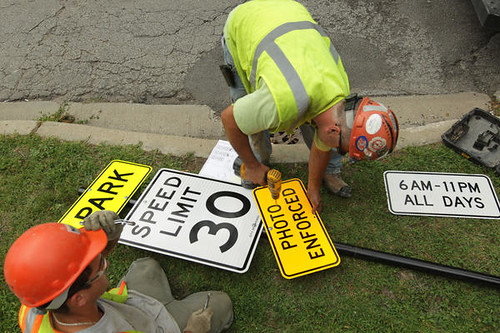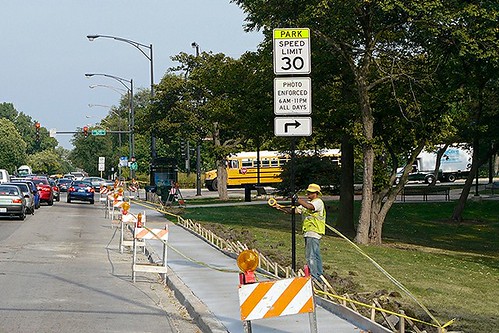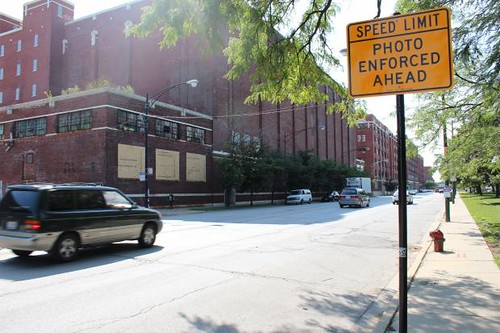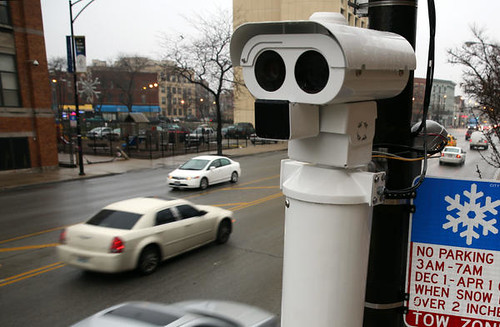On Friday the Chicago Department of Transportation announced that nine automated speed enforcement cameras near four neighborhood parks have issued warnings to more than 200,000 speeders in the first 40 days of operation. Of those violations, more than 200 involved drivers going over 60 mph, at least twice the 30 mph speed limit. Ten were traveling over 80 mph, and one motorist was driving a terrifying 90 mph on city streets.
You would think that the Tribune would respond to the news with a story about how these numbers indicate that Chicago has a reckless driving epidemic. Perhaps the paper would acknowledge that the cameras represent an appropriate enforcement measure. Instead, the Trib clung to its hypothesis that this safety initiative is merely a money grab by the mayor, with the headline “Emanuel speed cameras may bring in more revenue than expected.”
“Mayor Rahm Emanuel has touted his speed camera program as a way to improve traffic safety for children near the city's parks and schools,” wrote reporter Bill Ruthhart. “But the early warning violations from Chicago's first speed cameras are the latest indicator that the fledgling program could be a financial windfall for the city.”
The article, which uses somewhat different figures than Friday's CDOT press release, focuses on the fact that these nine cameras, which issued 233,000 warnings in 45 days, would have produced $13.8 million in fines had they actually been producing tickets. Ruthhart writes that while Emanuel had predicted the cameras would bring in $15 million in revenue by the end of 2013, these figures suggest the cameras could bring in far more money.
The Trib piece fails to mention that any revenue generated by the speed cameras would be earmarked for traffic safety and violence prevention efforts such as crossing guards and police officers around schools, infrastructure like crosswalks and warning signs, plus after-school, anti-violence and job-training programs. It also leaves out the info about the hundreds of motorists who were clocked going over 60.
Ruthhart did talk to CDOT Deputy Commissioner Scott Kubly, who said that while the number of speeders was surprisingly high, data indicates that the 30-day warning period for each camera, in which violators are mailed notices but not tickets, is changing drivers’ behavior. On the first day each of the nine cameras operated, the number of warnings totaled 11,884, but two weeks later that figure had dropped by 43 percent to only 6,724.
"These are warnings and not tickets for a reason," Kubly told Ruthhart. "We expect behavior to change dramatically, which it already has, and we think it's going to change even more."
Tomorrow the city will begin issuing actual tickets for violations at Gompers Park, Foster Avenue and Pulaski Road, where neighbors have argued reckless driving is a major problem and have lobbied for a road diet on Foster. To gradually nudge motorists towards safer behavior, at first the city will only send tickets to drivers caught going ten mph or more over the speed limit. Eventually that threshold will be dropped to five mph.
Currently, speed cameras are operating in ten designated safety zones around parks and schools, and CDOT plans to have them installed at 50 safety zones by the end of the year. Cameras at McKinley, Marquette and Garfield parks are in the warning-processing period and will begin issuing tickets on October 21. Those at Douglas, Legion, Washington, Humboldt, and Major Taylor parks are currently in the warning-issuing phase. To further encourage compliance with the speed limit, CDOT is installing 20 speed indicator signs at speed camera locations this week.
Once the ticketing phase begins at each location, drivers will receive a warning in the mail for their first violation and a fine for their second. Tickets are $35 for speeding by six-to-ten mph and $100 for vehicles going ten mph or more over the speed limit.
Disappointingly, 46th Ward Alderman James Cappleman, usually a progressive on transportation issues, wasn’t convinced by the new numbers that the cams are about safety, not money. “What I need to see from this data, and when tickets start occurring, is: are lives being saved by this, and are there fewer car accidents?” he told Ruthhart. “There are a lot of people who believed the reason for these cameras was to generate revenue, and I share that belief.”
An even more troubling response came from James Walker, executive director of the National Motorists Association, in a relatively balanced DNAInfo article by Mike Brockway. Walker claimed that the massive number of tickets means that the 30 mph speed limit is too low. “It's absolute proof that speed limits are set incorrectly on the main roads in Chicago,” he said. “You cannot have this extremely high level of violations where the speed limit is set for maximum safety and smooth traffic flow.”
Let’s give Walker the benefit of the doubt and assume he’s not arguing that our too-low speed limit caused more than 200 motorists to drive over 60, which indicates a complete lack of respect for other people’s lives. And perhaps there are some situations where a slightly higher speed limit might result in fewer fender-benders for drivers.
But Walker’s statement shows a total disregard for the safety of people on foot. Chicago’s speed limit makes sense because studies show that pedestrians struck by drivers at 40 mph almost always die, those struck at 30 mph have about a 50/50 survival rate, and those struck at 20 mph almost always live.
About 140 people per year are killed in traffic crashes in Chicago, with an additional 16,000 injuries. If anything, our speed limit should be lower.









